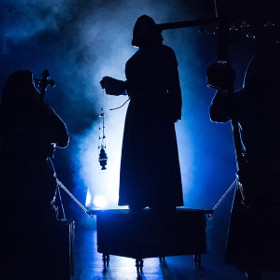Michael Coveney: Chaucerian choices at the Unicorn, and Gielgud re-visited

There was a time when Chaucer's Canterbury Tales were always within earshot in the theatre. The stage musical adapted from Nevill Coghill's famous "translation" from the Middle English by Martin Starkie ran for many years in the West End, mostly at the Phoenix Theatre, and there have been countless films using one or several of the stories as the starting point.
But not even Starkie used The Pardoner's Tale, so it's bracing to see the fable of greed and murder reanimated, and with a large chunk of the prologue, too, at the Unicorn Theatre, daringly aimed at the 7-11 year-old age group. This whole section of the Tales is drenched in riot and alcohol, and the pardoner himself is a shyster and mountebank of the first order.
Lewis Gibson's adaptation preserves a true Chaucerian flavour – without any of the "rude" words – and Gary Lagden's bearded, blue-cloaked pardoner, accompanied by two versatile musicians also in blue, strikes a nice balance between overweening false piety and audience-embracing high spirits; he starts off flogging pardons (to be kept as receipts to the end of time) to "penitent" children who don't like homework and have eaten too many sweets.
Once he gets to the story itself, Lagden plays all three loafers who somehow manage to kill each other when suddenly presented with a bag of gold in the forest. That bag drops from the roof of the theatre with an ominous and dangerous thud, a real coup and a sure sign that greed (not necessarily money) is the root of all evil. The three yobbos have initially set off to find Death, who is causing a bit of local trouble and dismay; and of course they find him, but not in the way they had hoped.
At one point, Lagden ambles away from the stage, as the story comes to its climax, saying with a shrug that we all know what's going to happen, why bother spelling it out. The kids in the Unicorn went crazy, calling him back and relishing every gory detail of the stabbings, the poisonings and, not least, the grim tone of the moralising conclusion.
In all the years I've been going to the Unicorn I've never penetrated the smaller Clore auditorium on the ground floor (the larger, horse-shoe shaped Weston, where The Pardoner's Tale is playing, is at the top of the building). So I took the opportunity on Saturday afternoon to dash down from the hour-long Chaucer performance and pop immediately into the other new show, Cuckoo.
This proved something of a trial, as you can see what is behind Nathan Curry's production of rookie playwright Suhayla El-Bushra's tale of two teenage girls several miles off. One moves in with the other and is more or less adopted by the other's mother, a do-gooding middle-class aid worker who has a warped idea of trying to make charity begin at home.
It's not a bad idea, and the two girls are very well played and contrasted by two members of the Unicorn Young Company, Eden Howard as the initially withdrawn Jenny and Kate Lassman-Long as Nadine, her disruptive and extremely foul-mouthed friend – making their professional debuts. But the shifting dynamics in their relationship, and in their relationship to Sarah Malin's piously intoned widowed mum in her bandannas and sandals, are clumsily charted, almost as clumsily as the kitchen cupboards are pushed around the stage between scenes.
Cuckoo is aimed at the Unicorn's more adult audience (including 16 year-olds plus), which is odd, as I thought that the Unicorn was a theatre primarily for children. Can't the adults go elsewhere for their entertainment? Whoever turned up on Saturday constituted a pretty grim crowd, anyway, probably puzzled as to why they were watching a play that they'd more readily expect to see on an off day in the Theatre Upstairs.
I understand the principle of making children's theatre so good that adults enjoy it just as much – this is a given, and a truism, when it works, which is quite often these days under the artistic directorship of Purni Morell – but I don't understand the impulse to make plays about children aimed solely, or even mostly, at adults. And in this case, the proviso seems only to account for the swearing and drug-taking. The kids could probably cope with that anyway; no problems with The Pardoner's Tale.
As a foot-note to the latter, I see that Jonathan Croall is bringing out a Biographer's Tale next month, reporting on the trials and tribulations he endured while writing his excellent biography of John Gielgud.
These obstacles are flagged up as threefold: a sustained attack by a rival biographer (Oh, that will be the late Sheridan Morley then; look out for the juicy squeak of score-settling); the wayward behaviour of an elusive editor (perhaps the editor had been nobbled by Morley, too?); and the unpredictable attitude to the book of Gielgud himself.
The last one sounds characteristic Gielgud, as he habitually disclaimed all praise, profile and deferential reference to his acting with a confused and embarrassed performance of bluff denial and sorrow. "And Sheridan's writing your biography…" I once said to him. "Oh, I do wish he wouldn't," he zinged back. But he didn't really mean that. I think. It was reflex self-protection.










